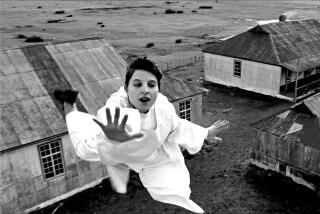Review: ‘Karl Marx City’ chillingly revisits life in the shadow of East Germany
- Share via
More than once in “Karl Marx City,” a shrewd personal inquiry into the mass psychology of fear and oppression, documentary filmmaker Petra Epperlein can be seen walking the streets of the former German Democratic Republic, carrying a large microphone. She is recording — as is her cinematographer, co-director and husband, Michael Tucker — but unlike the thousands of civilian informants once employed by the East German Ministry for State Security (a.k.a. the Stasi), she keeps her equipment out in the open, making no secret of her activities.
That’s an important distinction in a film that ingeniously subverts the weaponry of Cold War-era surveillance, employing the tools of the Stasi’s intelligence-gathering operation toward a far more principled end. Whereas the secret police sought to root out and destroy even the slightest hint of subversive activity among a terrified populace, Epperlein and Tucker sift through these illicit materials — and forge their own fresh images and interviews — with an eye toward illuminating the truth and possibly even vindicating the innocent.
That Epperlein herself appears on camera is neither an accident nor a sign of authorial indulgence. She grew up in Chemnitz, a former East German manufacturing town that was once known as Karl-Marx-Stadt, or Karl Marx City. (A 40-ton bronze sculpture of Marx’s head still sits in the middle of the city, an ominous reminder of its Communist legacy and one hell of a Big Brother metaphor.)
It was here that Epperlein’s father hanged himself in 1999, a decade after the collapse of the Berlin Wall. Before his suicide, he had received letters threatening to expose him as a former Stasi informant, a charge that doesn’t square with Epperlein’s memory of her father as a thoroughly decent and trustworthy man.
But then, one of the film’s most troubling insights is that countless good men and women (and even children) were pressed and manipulated into service by the Stasi, who were skilled at using even the smallest nuggets of information as weapons of intimidation and control. The documentary continually lays bare the cruelty of a system that turned family members and friends against each other, effectively destroying the most crucial resource — trust — that a society needs to survive.
Shot in evocative black and white, “Karl Marx City” is a sleek, absorbing detective story, a fascinating primer on mass surveillance in the pre-Snowden era, and a roving memoir of East German life. Epperlein returns to her hometown and steers the film down several intriguing alleys, including the curious phenomenon of Ostalgie, or nostalgia for life in East Germany. One expert coolly dismisses the premise of “The Lives of Others,” Florian Henckel von Donnersmarck’s Oscar-winning 2006 drama about a Stasi agent who goes rogue to protect the people he’s spying on, as an implausible fabrication.
This isn’t the first time Epperlein and Tucker have sifted through the wreckage of an authoritarian regime, as they did in their 2005 Iraq war documentary, “Gunner Palace,” which followed U.S. troops stationed in what was once Uday Hussein’s pleasure palace. In “Karl Marx City,” Epperlein seeks answers about her father at the former Stasi headquarters in Berlin, diving into an endless labyrinth of shelves that house the files kept on the East German populace (a staggering 69 miles’ worth of material).
In the film’s most fascinating moments, we see some of the grainy black-and-white footage recorded by Stasi informants: shots of friends and neighbors going in and out of buildings, or walking home from the store. The mundanity of the images doesn’t make them any less creepy or unnerving. In her voice-over narration, Epperlein describes the footage as “a kind of documentary truth, an epic of routine,” but it is also a chilling reminder of the banality of evil.
------------
‘Karl Marx City’
No rating
In English and German with English subtitles
Running time: 1 hour, 29 minutes
Playing: Laemmle’s Monica Film Center, Santa Monica
See the most-read stories in Entertainment this hour »
Movie Trailers
More to Read
Only good movies
Get the Indie Focus newsletter, Mark Olsen's weekly guide to the world of cinema.
You may occasionally receive promotional content from the Los Angeles Times.











